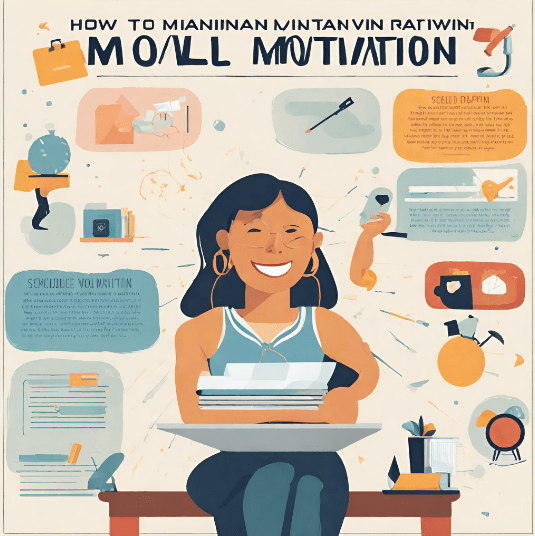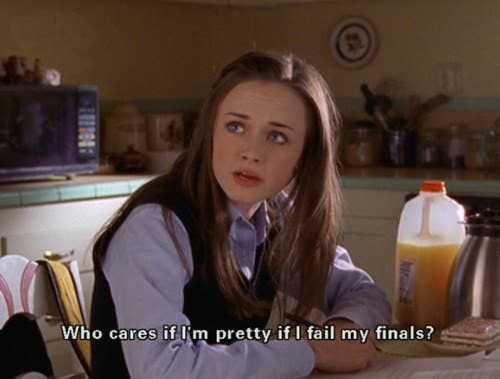How to stay motivated!
During senior year of high school in the midst of trying to find a balance between the piling schoolwork and extracurriculars, college applications and the insecurities that come with evaluating yourself and your contributions, and senioritis, it’s easy to lose motivation and burn-out. In this guide to maintaining motivation, we’ll review the strategies of Meiya Weeks, a current high school senior, who is facing these struggles altogether.

Divide your time wisely, into a realistic schedule for yourself
“You have to set time to do every task and assignment, going with the flow is the number one way to get distracted and waste time.” Meiya emphasizes the importance of creating a realistic schedule for academic and extracurricular tasks, but also for social time with friends and family.
Develop a routine
“Simply setting the schedule and following it for a day won’t make a difference in the long run, you have to stay consistent.” She highlights how important it is to stick with the schedule despite distractions. Make the schedule work for you, not the other way around.
Link schedules with a friend!
“I’m always at a cafe drinking coffee and doing work with a friend. The fact that there’s someone with me working so hard is both inspiring and motivating.” She shares her experience with sharing work environments with her close friends, stating how it helped her complete her tasks without becoming overwhelmed because of the moral support.
Celebrate the small wins
“It’s so easy to lose motivation and fall behind during this time of year. Even getting out of bed in the morning or finishing the assignments due that night just in time are accomplishments to be celebrated.” She says it’s important to be kind to yourself and relish in the small achievements you’ve made even if you fell behind during the day.
Discipline
“I’ve gone on and on about how to lose motivation, but we both know students this day and age inevitably will. Discipline is what’s more important and what we can fall back on.” Despite the loss of motivation, she emphasizes the importance of discipline. Of completing tasks despite not wanting to do anything other than rotting in your bed.
This experience shared by a fellow classmate creates a solid foundation upon which we can build another year full of practical accomplishments and fun experiences.
Is Doing Nothing A Good Use Of Your Time?

Hustle culture has reached a peak in modern society. From a young age, we’re pushed into various sports and activities, and to compete for a spot in a good university we need stellar extracurriculars, volunteer hours, and honors. Our formative years are filled with these engagements, initially promising fun and allure. Yet, as we mature, the stark reality dawns on our adult consciousness – this ceaseless cycle is life. The expectation persists to perpetually strive, push boundaries, and remain constantly occupied. This pattern seeps into our adult existence, where having multiple income streams is no longer a choice merely for savings but a necessity to secure wealth for our future generations.
Amid the surge in mental health concerns due to burnout, this culture raises questions regarding the division of time between physical exertion and mental repose.
This hustle culture so focused on always keeping busy fails to recognize the need for our bodies and minds to rest. Burnout stemming from hustle culture signifies a perpetual state of stress and exhaustion fueled by the relentless pursuit of excessive work. It glorifies busyness and overexertion while disregarding the consequences of physical and emotional fatigue, ultimately leading to diminished efficiency over time. This notion that success is exclusively derived from unwavering productivity, neglecting the significance of mental well-being and elevating work above all else.
One may think that taking a break from the source of the burnout weather that may be school or work, would allow for replenishment. An article released by a psychoanalysis therapist suggests that “doing nothing,” similarly provides the same condition of fatigue associated with burnout. Abruptly halting the routines of daily life does not abstain one from societal pressures. Often, individuals experiencing burnout opt for a break not due to sheer mental and physical exhaustion, but rather as a response to decreased efficiency. They fill their days with leisure activities instead of truly halting everything, fearing that idleness is a waste of precious time. They find themselves filling up their days with leisure activities instead of putting a halt to everything because they feel that doing nothing is a waste of good time. By the time they’re back, they haven’t rested physically or mentally, and the cycle begins once again. In this context, “doing nothing” implies a state of mental and physical relaxation. How is it that society has indirectly convinced us that not doing something at all times is unacceptable?
Doing nothing, in this sense, places an emphasis on the actions of taking measures to allow yourself peace like resolving underlying issues that cause stress and anxiety. Too often we attempt physical relaxation while still ruminating on these stressors, yielding no positive outcomes. Addressing these stressors is imperative to resolve a state of burnout. Only then can engaging in “doing nothing” be truly effective.
However, this doesn’t discount the validity and success of hustle culture, which has seen remarkable breakthroughs in recent years through platforms like social media and secondary incomes such as stock investing. Nevertheless, when hustle leads to an accumulation of exhaustion directly impacting one’s work, prioritizing moments of “doing nothing” becomes crucial. Rest and reset days shouldn’t be perceived as a lack of productivity, but rather as what they truly are – essential periods for rest.
Works Cited
Cohen, Josh. “The Way Of Burnout.” The Economist, The Economist Newspaper, 28 July 2016, www.economist.com/1843/2016/07/28/the-way-out-of-burnout.
Johnston, Bria. “Doing Nothing On Your Holiday.” The Age, 22 July 2023, pp. 26–26.
Smyth, Ronan. “Graham: I Spend Most Of My Time Doing Nothing.” Daily Mail, 6 July 2022.
Is Doing Nothing A Good Use Of Your Time?
| Hustle culture is at an all time high in modern society. At a young age, we’re pushed into various sports and activities, and to compete for a spot in a good university we need stellar extracurriculars, volunteer hours, and honors. Our youth is filled with these activities that start out as fun and enticing, then the reality starts to set into the adult brain- that this is just life. We have to constantly keep doing, keep pushing, and keep busy. This also bleeds into our adult life as the need for several sources of income is now essential in not only keeping up a savings account, but building wealth for our future familial generations. This hustle culture is so focused on always keeping busy and fails to recognize the need for our bodies and minds to rest. Especially with the recent spike of mental health issues due to the recent pandemic that have caused suicide rates to increse, the need for rest is crucial. Now this is not to say that hustle culture isn’t completely valid and successful, because it is. Minorities with historically low wealth rates are participating the most in this, and that’s something to be spoken about. They are the group with lack of access to psychological healthcare workers which puts them at the risk of the burnout that comes with always doing something. |
A Personal Experience

I can’t live to tell you the overall, general experience of a typical high school student in the year 2023. I am what it seems is the epitome of diversity: the black, bisexual, muslim, immigrant, hijabi woman who lives in a predominantly white city state that mirrors the rest of society. I only can tell the tale that is mine.
It feels as though the canon events that are the high school experience have completely skipped over me. It’s not the only reason I believe that the lasting aspects of my character define my course of life and the current life I live. Going to a high school that so outwardly reflects the state of American society has proved to be challenging. The challenging aspects of school not only include the typical responsibilities; the difficult school work, climbing up the ladder in extracurriculars, balancing school, work and extracurriculars, but also stepping into the role of an absent parent in a household, and finding where I lie in the spectrum that is my American identity and my ethnic one.
High School in 2023 has exhibited a series of struggles that seem to affect my everyday life. The biggest one I face is my diagnosis of chronic migraines that seems all but livable. It’s a condition not serious enough to obtain adjustments, but also not minor enough to ignore. It’s a struggle every day as I deal with light, sound, and bass sensitivity that affects the condition in which I perform my duties.
High School in 2023 has students faced with much more than just the academics, but so many other societal and political controversies around us. We’re living through the ages of the progressive times in our stage of life that we’re supposed to be discovering ourselves and making the hardest decision on where we want to be next and the mark we’d like to make on the world.
Welcome to Manab J’s AP Blog!
Hello world!
Welcome to your brand new blog at Edublogs!
To get started, simply visit your blog’s dashboard, edit or delete this post and check out all the other options available to you.
Like more help?
We can walk you through step-by-step in our guide to getting started with your blog.
Happy blogging!